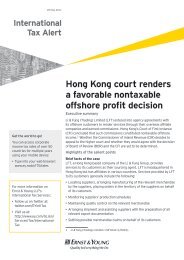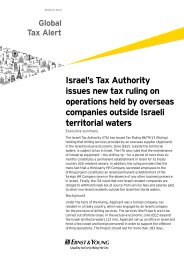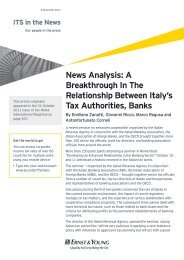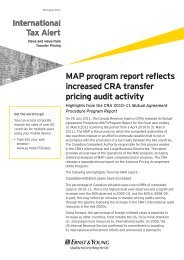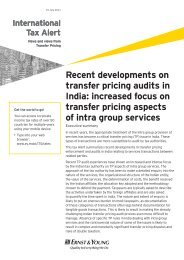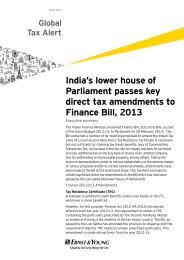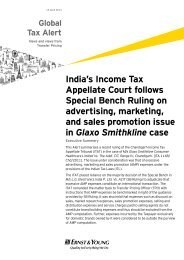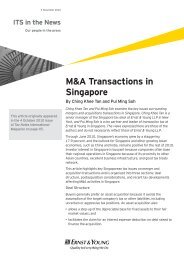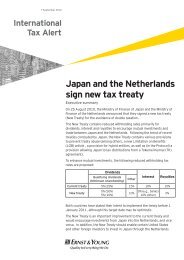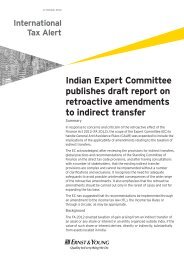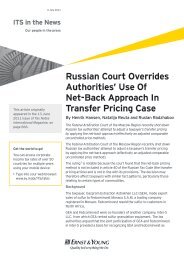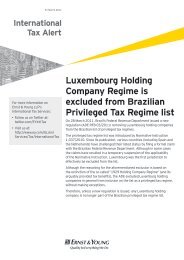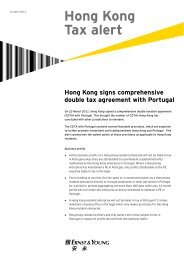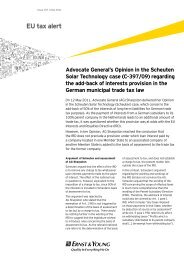European Commission may challenge Swedish interest limitation rules
European Commission may challenge Swedish interest limitation rules
European Commission may challenge Swedish interest limitation rules
Create successful ePaper yourself
Turn your PDF publications into a flip-book with our unique Google optimized e-Paper software.
10 April 2013<br />
Global<br />
Tax Alert<br />
<strong>European</strong> <strong>Commission</strong><br />
<strong>may</strong> <strong>challenge</strong> <strong>Swedish</strong><br />
<strong>interest</strong> <strong>limitation</strong> <strong>rules</strong><br />
The <strong>Swedish</strong> Government recently responded to a letter from the<br />
<strong>European</strong> <strong>Commission</strong> questioning the compatibility of the <strong>Swedish</strong><br />
<strong>interest</strong> <strong>limitation</strong> <strong>rules</strong> with <strong>European</strong> Union (EU) law. Interest deductions<br />
<strong>may</strong> potentially be allowed by reference to EU law, and possibilities of<br />
reclaiming previously paid taxes <strong>may</strong> arise should the <strong>Commission</strong> bring<br />
an action before the <strong>European</strong> Court of Justice.<br />
Background<br />
Interest <strong>limitation</strong> <strong>rules</strong><br />
As of 1 January 2009, the <strong>Swedish</strong> Income Tax Act contains <strong>rules</strong> limiting<br />
the deductibility of <strong>interest</strong> expense. The present version of the <strong>rules</strong>, in<br />
force as of 1 January 2013, limits as main rule deductibility with regard to<br />
all intra-group loans. Further, the <strong>rules</strong> apply to certain external fi nancing<br />
related to internal acquisitions of shares, primarily in respect of so-called<br />
back-to-back loans.<br />
Deductions are allowed if either of the two available exemptions is<br />
applicable. Under the ten percent rule, deductions shall be allowed if the<br />
<strong>interest</strong> income corresponding to the expense would be taxed at a rate of<br />
at least ten percent in the hands of the benefi cial owner had the <strong>interest</strong><br />
been the only income of the recipient/benefi cial owner. Specifi c <strong>rules</strong> apply<br />
with respect to situations where the recipient of the <strong>interest</strong> income is<br />
subject to yield tax (e.g., life insurance companies). The ten percent rule is<br />
not applicable where the debt relationship has been created predominantly<br />
to provide the group with a substantial tax advantage.<br />
Further, the business reasons exemption provides, subject to certain further<br />
requirements, that <strong>interest</strong> expense shall be deductible if the debt<br />
relationship is predominantly motivated by business reasons.
2<br />
Supreme Administrative Court<br />
judgment<br />
The <strong>Swedish</strong> Supreme<br />
Administrative Court ruled in<br />
November 2011 that the previous<br />
version of the <strong>interest</strong> <strong>limitation</strong><br />
<strong>rules</strong> (in force until 31 December<br />
2012) was not contrary to the EU<br />
freedom of establishment principle.<br />
The Supreme Administrative Court<br />
considered that the ten percent rule<br />
could potentially be discriminatory<br />
from the perspective of EU law.<br />
However, the Supreme<br />
Administrative Court concluded<br />
that any difference in treatment<br />
of internal and cross border<br />
transactions was merely due to<br />
divergences between the tax<br />
systems of the various member<br />
states and did, therefore, not<br />
constitute a restriction of freedom<br />
of establishment.<br />
Challenge from the <strong>European</strong><br />
<strong>Commission</strong><br />
The <strong>European</strong> <strong>Commission</strong> does<br />
however not fi nd the judgment<br />
of the <strong>Swedish</strong> Supreme<br />
Administrative Court persuasive<br />
given that the ten percent rule in<br />
practice only applies in cross border<br />
situations. Further, the <strong>Commission</strong><br />
holds that the restriction cannot<br />
be justifi ed under the so called<br />
rule of reason (justifi cation due to<br />
an overriding reason in the public<br />
<strong>interest</strong>). Accordingly, Sweden<br />
failed to fulfi ll its obligations<br />
under EU law in the view of the<br />
<strong>Commission</strong>.<br />
The <strong>Swedish</strong> Government has<br />
replied, in a 40 page response to<br />
the <strong>Commission</strong>, that it agrees<br />
with the view of the Supreme<br />
Administrative Court that there is<br />
in fact no restriction, and has<br />
further argued that there should<br />
in any case be the possibility to<br />
justify the <strong>limitation</strong> <strong>rules</strong>.<br />
A potential justifi cation fulfi lling<br />
the requirements laid down by the<br />
<strong>European</strong> Court of Justice would<br />
entail that the <strong>rules</strong> would not be<br />
contrary to EU law.<br />
Comments<br />
There is a position in favor of the<br />
view that the <strong>interest</strong> <strong>limitation</strong><br />
<strong>rules</strong> are contrary to the freedom of<br />
establishment principle. Assuming<br />
Global Tax Alert<br />
the <strong>Commission</strong> maintains this<br />
position, the next step would be<br />
a “reasoned” opinion to which<br />
the <strong>Swedish</strong> Government would<br />
in turn respond. The <strong>Commission</strong><br />
can thereafter decide to bring an<br />
action against Sweden before the<br />
<strong>European</strong> Court of Justice, asking<br />
the Court to declare that Sweden<br />
has failed to fulfi ll its obligations<br />
under EU law.<br />
The letter from the <strong>Commission</strong><br />
opens a door for the <strong>rules</strong> to be<br />
tried by the <strong>European</strong> Court of<br />
Justice. Under these circumstances,<br />
it would be prudent to consider<br />
whether any previously paid taxes<br />
could be reclaimed based on a<br />
reassessment or whether future<br />
<strong>interest</strong> expense <strong>may</strong> be deductible<br />
by reference to EU law. Companies<br />
<strong>may</strong> also want to consider the fi ling<br />
of protective claims.
For additional information with respect to this Alert, please contact the<br />
following:<br />
Ernst & Young AB, Stockholm<br />
• Rikard Ström +46 8 5205 9208 rikard.strom@se.ey.com<br />
• Erik Hultman +46 8 5205 9468 erik.hultman@se.ey.com<br />
Ernst & Young GmbH Wirtschaftsprüfungsgesellschaft, Munich<br />
• Dr. Klaus von Brocke +49 89 14331 12287 klaus.von.brocke@de.ey.com<br />
Ernst & Young LLP, Scandinavian Tax Desk, New York<br />
• Martin Norin +1 212 773 2982 martin.norin@ey.com<br />
3 Global Tax Alert<br />
Ernst & Young<br />
Assurance | Tax | Transactions | Advisory<br />
About Ernst & Young<br />
Ernst & Young is a global leader in<br />
assurance, tax, transaction and advisory<br />
services. Worldwide, our 167,000 people<br />
are united by our shared values and an<br />
unwavering commitment to quality. We<br />
make a difference by helping our people,<br />
our clients and our wider communities<br />
achieve their potential.<br />
Ernst & Young refers to the global<br />
organization of member firms of<br />
Ernst & Young Global Limited, each of<br />
which is a separate legal entity.<br />
Ernst & Young Global Limited, a UK<br />
company limited by guarantee, does<br />
not provide services to clients. For more<br />
information about our organization, please<br />
visit www.ey.com. Ernst & Young AB is a<br />
member firm serving clients in Sweden.<br />
www.ey.com<br />
© 2013 EYGM Limited.<br />
All Rights Reserved.<br />
EYG no. CM3343<br />
This publication contains information in summary form<br />
and is therefore intended for general guidance only. It<br />
is not intended to be a substitute for detailed research<br />
or the exercise of professional judgment. Neither EYGM<br />
Limited nor any other member of the global Ernst &<br />
Young organization can accept any responsibility for<br />
loss occasioned to any person acting or refraining from<br />
action as a result of any material in this publication. On<br />
any specific matter, reference should be made to the<br />
appropriate advisor.



